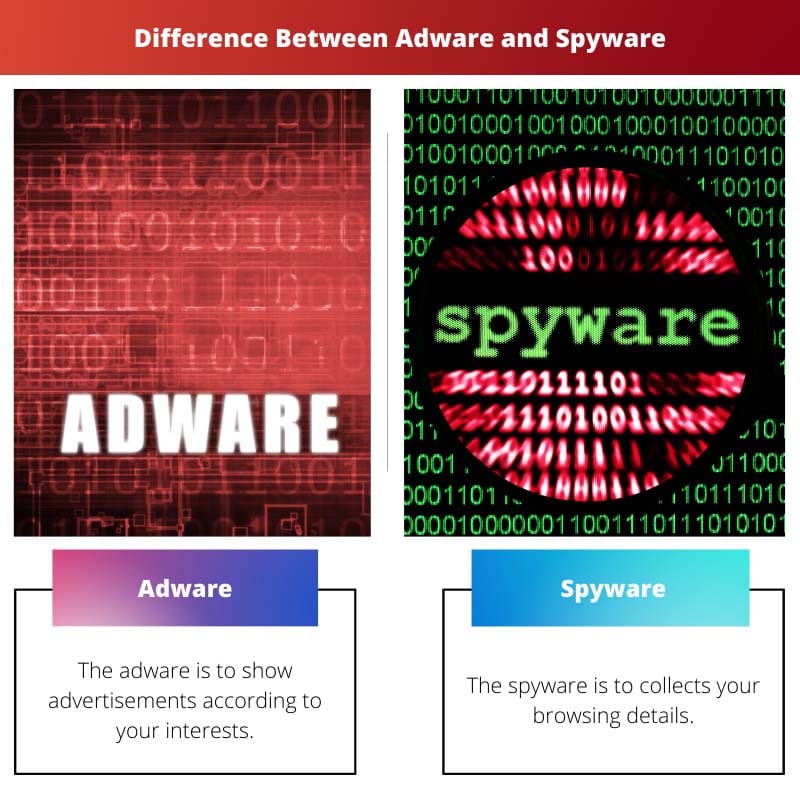The hackers are searching or doing something to hack the computers. Their main aim is to hack the computer and access the data. Adware and spyware are the properties that help them more to access someone’s private data.
Key Takeaways
- Adware is software that displays unwanted advertisements on a user’s computer, while spyware collects information about a user’s online activity without their knowledge.
- Adware is installed as part of free software downloads, while spyware is installed through malicious websites or links.
- Adware can be annoying and slow down a user’s computer, while spyware can seriously threaten a user’s privacy and security.
Adware vs Spyware
Adware pops-up ads that may be useful to you, while spyware pops up ads that maybe offensive to you or have no relevance to you. Adware pop-ups are important, while spyware pop-ups are not important. Adware generates online advertisements, while spyware is access to someone’s private data.

Adware is also a software known as advertisement-supported software. The adware shows the advertisements as a pop-up on your computer.
Spyware is like software that installs in your system without your knowledge and changes in your computer to get personal details.
Comparison Table
| Parameters of comparison | Adware | Spyware |
|---|---|---|
| Aim | The adware is to show advertisements according to your interests. | The spyware is to collects your browsing details. |
| Detection | The adware detects by an antivirus program. | The spyware is detected by anti-spyware. |
| Profit for creators | The adware generates online advertisements. | The spyware accesses someone’s private data. |
| Installation | The adware gets installed by being attached to unwanted pop-ups. | The spyware gets installed by attaching it to other applications. |
| Harmful level | The adware is less harmful. | Spyware is more harmful. |
| Example | The Fireball, Appearch are some adware. | The Bonzibuddy, Cydore are some spyware. |
What is Adware?
Adware is an advertisement-supported software. The main aim of adware is to generate advertisements related to the interest of users.
The adware is secretly installed on your computer once you click the unwanted sites or advertisements on the internet. It is legitimate software that needs no payment.
Adware is a popular source used by many famous companies to increase customers. They advertise according to your interest and make you buy with even without your knowledge.

What is Spyware?
Spyware is malware which is software installed on your computer without your knowledge. The spyware is installed in your system to collect the details of browsing history, passwords, documents, etc.
Spyware targets the sensitive information of the users, which is remotely accessed by hackers. It is a high-security threat that makes your system slow.
Spyware minimizes the system capacity and makes the process slow. The running rate will help to detect the spyware installed in your system. Spyware also reduces your network speed.

Main Differences Between Adware and Spyware
- The adware is less dangerous, and spyware is more harmful.
- The adware did not affect the operating system, and the spyware affected the operating systems.

- https://books.google.com/books?hl=en&lr=&id=UKNgoM3nLe0C&oi=fnd&pg=PR3&dq=spyware+vs+adware&ots=IVzxV_8_Yt&sig=nUpn2mHh294cP2FNuRTOEGFT0yc
- https://www.tandfonline.com/doi/pdf/10.1201/1079/45242.32.12.20050601/88294.2
Last Updated : 14 August, 2023

Sandeep Bhandari holds a Bachelor of Engineering in Computers from Thapar University (2006). He has 20 years of experience in the technology field. He has a keen interest in various technical fields, including database systems, computer networks, and programming. You can read more about him on his bio page.

The insights provided into the harmful effects of adware and spyware are valuable for users seeking to enhance their cybersecurity knowledge. Knowing how to identify and respond to these threats is essential.
Absolutely, being well-informed about adware and spyware allows users to adopt a proactive approach in safeguarding their digital privacy and security.
The content provides an excellent analysis of adware and spyware, equipping users with the knowledge they need to navigate the digital landscape securely. Understanding these digital threats is essential for all internet users.
Absolutely, everyone who uses the internet should be aware of the risks associated with adware and spyware, and how to protect their digital privacy effectively.
The distinction between adware and spyware is crucial in understanding the potential digital threats users may encounter. This knowledge can empower users to take the necessary precautions to protect their digital assets.
Indeed, the more informed users are about adware and spyware, the better equipped they will be to mitigate their impact on their personal information and cybersecurity.
Understanding the harmful effects of spyware and adware is crucial in today’s digital environment. It’s important for users to be aware of the risks and how to safeguard their personal information.
I couldn’t agree more. With cyber threats becoming increasingly sophisticated, knowledge about adware and spyware is essential for everyone who uses the internet.
The detailed explanation of adware and spyware offered here is very helpful. Users need to be aware of these digital threats and how to mitigate the associated risks.
I completely agree. This content provides valuable knowledge that is essential for all users navigating the digital landscape.
It is important to know the differences between adware and spyware. Adware shows ads to the user according to their interests, while spyware collects personal information without the user’s knowledge. It’s crucial to be aware of these threats to cybersecurity.
I completely agree. Both adware and spyware pose serious risks to users’ privacy and security, and knowing how to protect against them is crucial.
Indeed, understanding how adware and spyware operate is essential for everyone who uses computers and the internet.
Understanding the significance of adware and spyware in the context of cybersecurity is crucial. This information can help users protect themselves against potential security threats.
The comparison table provided here is very informative. It highlights the key differences between adware and spyware and how they operate. Everyone who uses a computer should be aware of this information.
Absolutely, knowing how adware and spyware function will help users identify and protect against potential threats.
I agree. The detailed comparison table provides valuable insights into the nature of adware and spyware and their impact on users’ systems.
The detailed comparison between adware and spyware is enlightening. It’s important for users to have access to this information to fortify their defenses against digital security threats.
The distinction between adware and spyware is well-explained. This information is valuable for users to recognize and respond to potential security threats effectively.
Absolutely, being informed about adware and spyware enables users to take proactive measures to protect their digital assets and personal information.